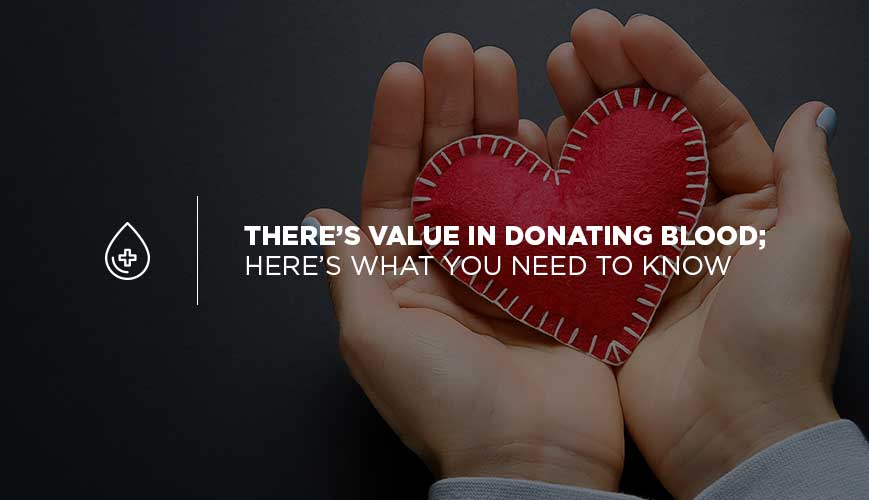There’s Value in Donating Blood; Here’s What You Need to Know
By Martha Michael

It is a life-saving mission to make sure there are enough blood products pumping through the supply chain to cover medical needs. January is National Blood Donor Month, which is a reminder of the importance of blood supply, a concept that is easier to understand after the last year revealed the shortages that occur when a public health system bears the weight of the world.
The Need for Blood
An article in Forbes says there’s an alarmingly low supply of blood due to the outbreak of COVID-19. With the rise in hospitalizations, 39 percent of community blood centers dropped to just a one-day or two-day supply in November. School closures have contributed to the shortfall, as adolescents and college students are a reliable source of blood donations. A report by ABC News says students account for 75,000 donations per year for the state of New York alone.
Strategically established in the middle of winter when the supply of blood and platelets dip to the lowest levels, National Blood Donor Month has been observed since 1970 after President Richard Nixon signed Senate Joint Resolution 154. Due to seasonal illnesses and inclement weather, the coldest months of the year make blood collection less probable, which is why it decreases.
The online newsletter for the nonprofit group Federally Employed Women, or FEW, explains the establishment of National Blood Donor Month and how there’s a mutual benefit for both those giving and those receiving. Some of the benefits for donors include:
- Burning calories - The process uses 650 calories which compares to a typical spin class
- Free blood test - As a donor, you can ask to be informed about irregularities in your blood
- Lower instance of heart disease - By reducing excess buildup of iron in your blood you have fewer cardiac events
- Reduced risk of cancer - Another byproduct of eliminating excess buildup of iron is to lower the atmosphere for carcinogens to thrive
- Good feeling you are helping people – The mental benefit speaks for itself
Many Americans have discovered an interdependence within the health community, where one person’s actions can diminish risks for others. Blood donation is a way to experience the mutual benefit that comes from accepting an inconvenience to provide for a patient who is struggling to recover.
How Recovered COVID-19 Patients Can Help
To make sure the nation’s supply is never bone dry, it is the work of such entities as the American Red Cross to keep their fingers on the pulse of factors affecting the level of blood products in storage. They are leading the charge to get antibody-rich blood to patients who can benefit.
According to the American Red Cross website, individuals who recovered from COVID-19 are being solicited to donate plasma for convalescent patients. The antibodies can be used as a possible treatment for individuals who are currently ill with the virus. Because of the pandemic, the medical staff is testing blood, plasma and platelet donations for the possibility of antibodies that can be used for transfusions.
Public health threat or not, hospitals and medical centers have an incessant need for blood and platelets. Those who are in shelter-in-place circumstances can still donate to meet their community’s needs.
“You can still go out and give blood,” says U.S. Surgeon General Jerome Adams on the Red Cross website. “We’re worried about potential blood shortages in the future. Social distancing does not have to mean social disengagement.”
To instill confidence in potential donors, the Red Cross outlines safety precautions accentuated due to the pandemic. They include:
- Accepting donations only from healthy individuals
- Personnel wearing gloves
- Enhanced disinfection of surfaces
- Sterile collection equipment
- Preparing each donor’s arm with aseptic scrub
- Blankets laundered after every use
- Social distancing and temperature checks
- All parties wearing face coverings
Donors and patients need to feel safe to be a part of the blood donation process, and the medical community understands the risks better than those outside the field of health services. Even when COVID-19 is no longer an issue, each year there will be vigilance about the blood supply and healthy citizens can answer the call.
To register for blood donation, call 800-RED CROSS (800-733-2767) or visit RedCrossBlood.org.
The information, including but not limited to, text, graphics, images and other material contained on this page are for informational purposes only. The purpose of this post is to promote broad consumer understanding and knowledge of various health topics, including but not limited to the benefits of chiropractic care, exercise and nutrition. It is not intended to provide or be a substitute for professional medical advice, diagnosis or treatment. Always seek the advice of your chiropractor, physician or other qualified health care provider with any questions you may have regarding a medical condition or treatment and before undertaking a new health care regimen, and never disregard professional medical advice or delay in seeking it because of something you have read on this page.